- Home
- Brandon Sanderson
Bands of Mourning Page 8
Bands of Mourning Read online
Page 8
“At least take me to Stansel—”
“No!” the man yelped. “Nope, can’t do it. Gotta go.”
“Well,” Wayne huffed, climbing out. “I’ve never been treated in such a manner! And we’re not even halfway down portway!”
“Sorry, my lord!” the man said, poling away as quickly as he could. “Sorry!”
Wayne cocked his hat, grinned, and checked the sign hanging from the streetlamp. Exactly where he’d wanted to go, and not a clip paid. He started whistling and strolled along the canal, keeping an eye out for a better offering. What would the god want?
Maybe that? he wondered, eyeing a line of people waiting at Old Dent’s roadside cart, wanting to buy some of his fried potatoes. Seemed a good bet.
Wayne wandered over. “Need some help, Dent?”
The old man looked up and wiped his brow. “Five clips a small pouch, eight for a large, Wayne. And don’t eat none of the stock, or I’ll fry your fingers.”
Wayne grinned, slipping behind the cart as the man turned back to his brazier and stirred a batch that was frying. Wayne took the customers’ money—and didn’t eat much of the stock—until the last man in line arrived, a fancy-looking fellow in a doorman’s jacket. Probably worked at one of the hotels down the lane. Good tips at those jobs.
“Three large,” the man said.
Wayne got his potatoes, took the man’s money, then hesitated. “Actually,” Wayne said, holding up a note, “do you have change? We got too many large bills.”
“I suppose,” the man said, digging in his nice eelskin wallet.
“Great, here’s a twenty.”
“I’ve got two fives and ten ones,” the man said, putting them down.
“Thanks.” Wayne took them, then hesitated. “Actually, I’ve got plenty of ones. Could I get that ten I saw in your wallet?”
“Fine.”
Wayne gave him a handful of coins and took the ten.
“Hey,” the man said, “there are only seven here.”
“Whoops!” Wayne said.
“What are you doing, Wayne?” Old Dent said. “There’s more change in the box under there.”
“Really?” Wayne glanced. “Rusts. Okay, how about you just give me my twenty back?” He counted the man back thirteen and poured the coins and bills into his hand.
The man sighed, and gave Wayne the twenty. “Can I just get some sauce for my chips?”
“Sure, sure,” Wayne said, squeezing some sauce onto the pouches, beside the potatoes. “That’s a nice wallet. Whaddaya want for it?”
The man hesitated, looking at his wallet.
“I’ll give you this,” Wayne said, plucking the flower off his ear and holding it out with a banknote worth ten.
The man shrugged and handed over the empty wallet, taking the bill and stuffing it in his pocket. He threw the flower away. “Idiot,” the man said, marching off with his potatoes.
Wayne tossed the wallet up and caught it again.
“Did you shortchange that man, Wayne?” Old Dent asked.
“What’s that?”
“You got him to give you fifty, and you gave him back forty.”
“What?” Wayne said, stuffing the wallet in his back pocket. “You know I can’t count that high, Dent. ’Sides, gave him ten extra at the end.”
“For his wallet.”
“Nah,” Wayne said. “The flower was for the wallet. The bill was ’cuz I somehow ended up with an extra ten completely on accident, very innocent-like.” He smiled, helped himself to a pouch of chips, and went wandering off.
That wallet was nice. His god would like that. Everyone needed wallets, right? He got it out and opened and closed it repeatedly, until he noticed that one side was worn.
Rusts. He’d been cheated! This wouldn’t work at all for an offering. He shook his head, walking along the canal promenade. A pair of urchins sat on one side, hands out for coins. The melancholy sound of a busker rose from a little farther down the path. Wayne was near the Breakouts, a nice slum, and he caught whiffs of their distinctive odor. Fortunately the aroma wafting from a nearby bakery overwhelmed most of it.
“Here’s the thing,” he said to one of the urchins, a girl not seven. He settled down on his haunches. “I ain’t travailed enough.”
“… Sir?” the girl asked.
“In the old stories of quests, you gotta travail. That’s like traveling, but with an ailment stapled on. Headaches and the like; maybe a sore backside too.”
“Can … can I have a coin, sir?”
“Ain’t got no coins,” Wayne said, thinking. “Damn. In the stories they always tip the urchins, don’t they? Lets ya know they’re the heroes and such. Hold here for a sec.”
He stood up and burst into the bakery, real heroic-like. A woman behind the counter was just pulling a rack of meat buns out of the oven. Wayne slammed his fork down onto the plain wooden countertop, leaving it flourished there like a rusting legendary sword.
“How many buns’ll you give me for this?” he asked.
The baker frowned, looking at him, then taking the fork. She turned it over in her fingers. “Mister,” she said, “this is silver.”
“So … how many?” Wayne asked.
“A bunch.”
“A bunch’ll do, fair merchant.”
A moment later he emerged from the bakery holding three large paper sacks filled with a dozen buns each. He dropped a handful of change the baker had insisted on giving him into the urchins’ hands, then held up a finger as their jaws dropped.
“You,” he said, “must earn this.”
“How, sir?”
“Take these,” he said, dropping the sacks. “Go give the stuff inside away.”
“To who?” the girl asked.
“Anyone who needs them,” Wayne said. “But see here, now. Don’t eat more than four yourselves, all right?”
“Four?” the girl said. “All for me?”
“Well, five, but you bargain hard. Little cheat.” He left them stunned and danced along the edge of the canal, passing the busker, who sat strumming an old guitar.
“Something lively, minstrel!” Wayne called, tossing the silver spoon into the man’s overturned hat, which awaited tips.
“Here now,” the man said. “What’s this?” He squinted. “A spoon?”
“Merchants are apparently desperate for the things!” Wayne called. “They’ll give you half a hunnerd meat buns for one, with change to boot. Now, give me ‘The Last Breath,’ minstrel!”
The man shrugged, and started plucking the song from Wayne’s mind. Ba-bum, ba-bum, ba-bum. Quick, energetic. Wayne rocked back and forth, eyes closed. The end of an era, he thought. A god to be appeased.
He heard the two urchins laughing, and opened his eyes to see them tossing meat buns at the people they passed. Wayne smiled, then kicked himself in a smooth skid along the edge of the canal, which was slippery with a coating of slime. He managed to go a good ten feet before losing his balance and slipping.
Which, of course, plunged him right into the canal.
Coughing, he pulled himself up onto the side. Well, maybe this would count as a travail. If not, it was probably poetry, considering what he’d done to Wax this morning.
He fished out his hat, then put his back to the canal. That was the way to go. Eyes forward, back turned toward the past. No sense getting your nose stuck in things that don’t matter anymore. He continued on his way, trailing water and spinning the last of the silverware—the knife—in his fingers. This was not the right offering for his quest. He was pretty sure of it. But what was?
He stopped at the next canal bridge, then stepped back. A short man in a uniform he didn’t recognize was walking down a nearby street with a little book in hand. Motorcars were parked here in various positions, most partly up onto the sidewalks. The man in the uniform stopped at each one, writing something down in his book.
Wayne followed after him. “Here now,” he asked the man. “What’re you doing?”
The little m
an in the uniform glanced at him, then back at his notebook. “New city ordinance about the parking of motorcars requires them to be left in an orderly manner, not up on the sidewalks like this.”
“So…”
“So I’m writing down the registry numbers of each one,” the man said. “And we’ll track down the owners and charge them a fine.”
Wayne whistled softly. “That’s evil.”
“Nonsense,” the man said. “It’s the law.”
“So you’re a conner?”
“Fine enforcement officer,” the man said. “Spent most of my time inspecting kitchens before last month. This is a lot more productive, I’ll tell you. It—”
“That’s great,” Wayne said. “Whaddaya want for the book?”
The man regarded him. “It’s not for trade.”
“I’ve got this here nice wallet,” Wayne said, holding it up, water dripping out the side. “Recently cleaned.”
“Move along, sir,” the man said. “I am not—”
“How ’bout this?” Wayne said, yanking out the knife.
The man jumped back in alarm, dropping his notebook. Wayne snatched it, dropping the knife.
“Great trade. Thanks. Bye.” He took off at a dash.
“Hey!” the man shouted, chasing after him. “Hey!”
“No tradebacks!” Wayne shouted, hand on his wet hat, running for all he was worth.
“Come back here!”
Wayne dashed out onto the main street along the canal, passing a couple of old men sitting on a tenement’s steps near the entrance to the slums.
“That’s Edip’s boy,” one of them said. “Always gettin’ himself into trouble, that one is.”
The man got hit in the face by a meat bun a second later.
Wayne ignored that, holding his hat to his head and running all-out. The conner was a determined one. Followed Wayne a good ten streets before slowing, then stopping, hands on his knees. Wayne grinned and ducked around one last corner before slamming his back against the bricks of a building, beside a window. He was pretty winded himself.
He’ll probably file a report, Wayne thought. Hope the fine they make Wax pay ain’t too large.
He ought to find something to bring back as an apology. Maybe Wax needed a wallet.
Wayne heard something beside him, and turned to see a woman with spectacles leaning out the window to look at him curiously. She was holding a pen, and just inside the window a half-finished letter lay on the desk in front of her. Perfect.
Wayne tipped his hat, snatching the pen from her hand. “Thanks,” he said, opening the notebook and scribbling some words. As she cried out, he tossed the pen back to her, then continued on his way.
The final destination, the god’s dwelling, was not far now. He veered down a street lined with trees and quaint smaller townhomes. He counted them off, then turned to the right and stood facing it. The god’s new temple. She’d moved here a few months ago.
He took a deep breath, banishing the music in his head. This had to be quiet. He crept carefully up the long walk to the front door. There, he quietly tucked the book into the spot between the doorknob and the door. He didn’t dare knock. Ranette was a jealous god, known for shooting people—for her, it was practically a governmental mandate. If the constables didn’t find a few corpses on her doorstep every week, they’d start to wonder if she wasn’t feeling well.
Wayne slipped away. He smiled, imagining Ranette’s reaction when she opened the door, and was so distracted that he almost ran right into Ranette herself walking up the path to her house.
Wayne stumbled back. Perfect brown hair, pulled back to expose a gorgeous face, weathered from her time in the Roughs. A fantastic figure, round in all the right places. Tall. Taller than Wayne. So he had something to look up to.
“Wayne! What were you doing at my door?”
“I—”
“Idiot,” she said, shoving past him. “You’d better not have broken in. Tell Wax I delivered those cords to him just now. He needn’t have sent someone to check on me.”
“Cords?” Wayne asked. What cords?
She ignored the question, muttering. “I swear, I am going to shoot you, you little maggot.”
He watched her go, smiled to himself, then turned and continued walking away.
“What’s this?” she said from behind him.
He kept walking.
“Wayne!” she shouted at him. “I’ll shoot you, right now. I swear I will. Tell me what you’ve done.”
He turned around. “It’s just a gift, Ranette.”
“A notebook?” she asked, flipping the pages.
He shoved his hands into his trouser pockets and shrugged. “Writin’ book,” he said. “You’re always writin’ stuff down, thinkin’ about things. Figured if there’s one thing you could always use more of, it’s a writin’ book. All those ideas you have must get pretty crowded up there. Makes sense you’d need places to store them.”
“Why’s it damp?”
“Sorry,” he said. “Forgot and stuck it in my pocket for a moment. But I got it right back out. I fought ten constables for that, I’ll have you know.”
She flipped through it, eyes narrowed in suspicion, until she reached the last page. “What’s this?” She held it up close and read the words he’d scrawled on the back page. “‘Thank you and goodbye’? What’s wrong with you?”
“Nothin’s wrong,” Wayne said. “I just figured it was time.”
“You’re leaving?”
“For a little, but that’s not what the words mean. I’m sure we’ll see each other again. Perhaps frequently and such. I’ll see you … but I won’t be seein’ you again. See?”
She looked at him for a long moment, then seemed to relax. “You mean it?”
“Yeah.”
“Finally.”
“Gotta grow up sometime, right? I’ve found that … well, a man wantin’ something don’t make it true, you know?”
Ranette smiled. Seemed an awful long time since he’d seen her do that. She walked to him, and he didn’t even flinch when she extended her hand. He was proud of that.
He took her hand, and she raised his, then kissed it on the back. “Thank you, Wayne.”
He smiled, let go, and turned to leave. One step into it, though, he hesitated, then shifted his weight to his other foot and leaned toward her again. “Marasi says you’re courtin’ another girl.”
“… I am.”
Wayne nodded. “Now, I don’t want to go wrong, seein’ as I’m being so gentlemanly and grown-up and the like. But you can’t blame a man for gettin’ ideas when hearing something such as that. So … I don’t suppose that there’s a chance for the three of us to—”
“Wayne.”
“I don’t mind none if she’s fat, Ranette. I likes a girl what has something to hold on to.”
“Wayne.”
He looked back at her, noting the storm in her expression. “Right,” he said. “Right. Okay. Yeah. I don’t suppose, when we’re lookin’ fondly on this conversationalizing and our memorable farewell, we could both just forget I said that last part?”
“I’ll do my best.”
He smiled, took off his hat, and gave her a deep bow he’d learned off a sixth-generation doorman greeter at Lady ZoBell’s ballroom in the Fourth Octant. Then he stood up straight, replaced his hat, and put his back toward her. He found himself whistling as he went on his way.
“What is that song?” she called after him. “I know it.”
“‘The Last Breath,’” he said without turning back. “The pianoforte was playin’ it when we first met.”
He turned the corner, and didn’t look back. Didn’t even check if she’d sighted on him with a rifle or something. Feeling a spring in his step, he made his way to the nearest busy intersection and tossed the empty wallet into the gutter. It wasn’t long before a carriage-for-hire pulled up, and its coachman glanced to the side, saw the wallet, and scrambled down to grab it.
Das
hing out from an alley, Wayne beat the man to it, diving for the wallet and rolling on the ground. “It’s mine!” he said. “I seen it first!”
“Nonsense,” the coachman said, swatting Wayne with his horse reed. “I dropped it, you ruffian. It’s mine!”
“Oh, is that so?” Wayne said. “How much is innit?”
“I need not answer to you.”
Wayne grinned, holding up the wallet. “I tells you what. You can have it and everything that’s inside. But you take me to the Fourth Octant west train station.”
The coachman eyed him, then held out his hand.
Half an hour later, the coach rolled up to the rail station—a bleak-looking building with peaked towers and tiny windows, as if to taunt those trapped inside with a scant view of the sky. Wayne sat on the back footman’s stand, legs swinging over the side. Trains steamed nearby, rolling up to platforms to gorge themselves on a new round of passengers.
Wayne hopped down, tipped his hat to the grumbling coachman—who seemed well aware he’d been had—and strolled in through the open doors. He shoved his hands in his pockets and looked about until he found Wax, Marasi, and Steris standing amid a small hill of suitcases, with servants waiting at the ready to carry them.
“Finally!” Wax snapped. “Wayne, our train is nearly boarding. Where have you been?”
“Makin’ an offering to a beautiful god,” Wayne said, looking up toward the building’s high ceiling. “Why do you suppose they made this place so big? Ain’t like the trains ever come in here, eh?”
“Wayne?” Steris asked, wrinkling her nose. “Are you drunk?”
He put a bit of a slur into his speech. “Course not. Why … why’d I be drunk at this hour?” He looked at her lazily.
“You’re insufferable,” she said, waving to her lady’s maid. “I can’t believe you risked being late for a little liquor.”
“Wasn’t a little,” Wayne said.
When the train arrived, he joined the others in climbing aboard—Steris and Wax had ordered an entire car set aside for the lot of them. Unfortunately, the last-minute hiring meant it had to be hitched all the way at the back, and Wayne had to share a room with Herve the footman. Bugger that. He knew for a fact the man snored. He’d find someplace else to sleep, or else just stay up. The train to New Seran wasn’t going to take that long. They’d arrive before sunrise.

 Steelheart
Steelheart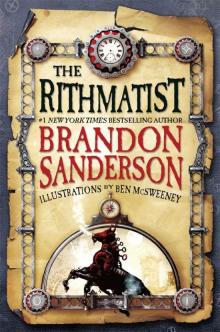 The Rithmatist
The Rithmatist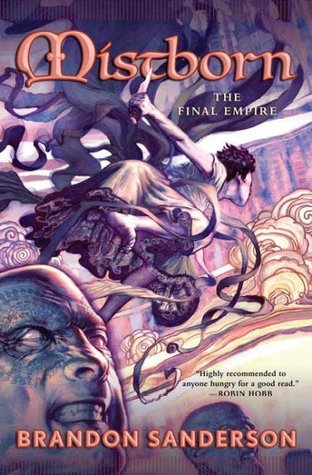 Mistborn: The Final Empire
Mistborn: The Final Empire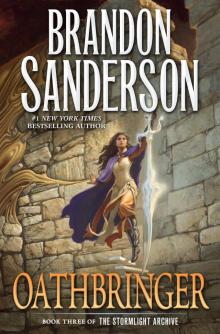 Oathbringer
Oathbringer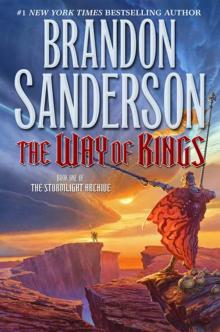 The Way of Kings
The Way of Kings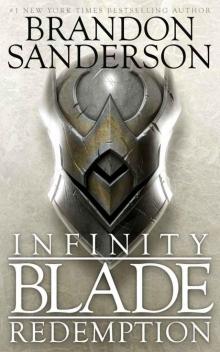 Redemption
Redemption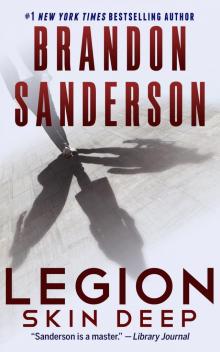 Skin Deep
Skin Deep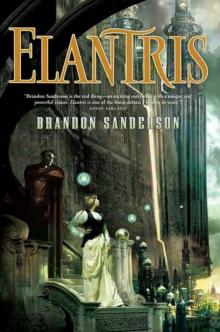 Elantris
Elantris Snapshot
Snapshot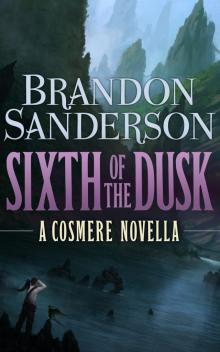 Sixth of the Dusk (Cosmere)
Sixth of the Dusk (Cosmere)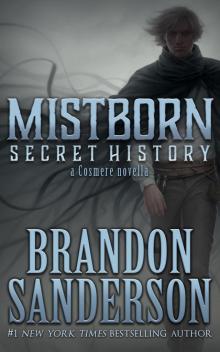 Mistborn: Secret History
Mistborn: Secret History White Sand, Volume 1
White Sand, Volume 1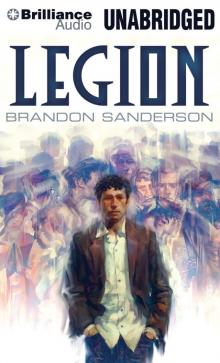 Legion
Legion The Well of Ascension
The Well of Ascension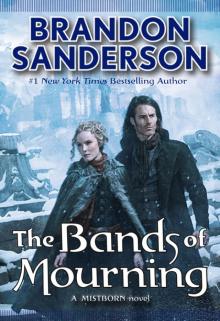 The Bands of Mourning
The Bands of Mourning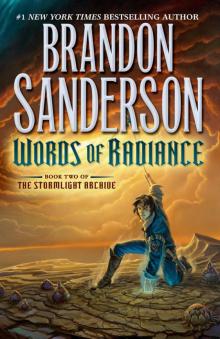 Words of Radiance
Words of Radiance The Hero of Ages
The Hero of Ages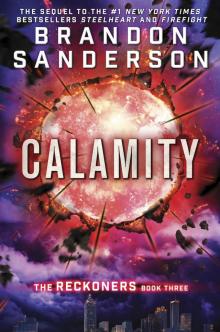 Calamity
Calamity Alcatraz Versus the Scrivener's Bones
Alcatraz Versus the Scrivener's Bones The Alloy of Law
The Alloy of Law The Emperors Soul
The Emperors Soul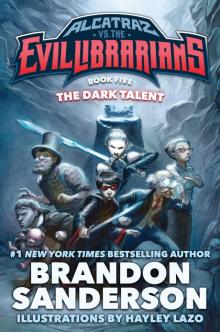 The Dark Talent
The Dark Talent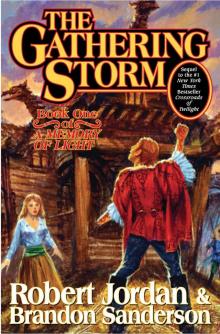 The Gathering Storm
The Gathering Storm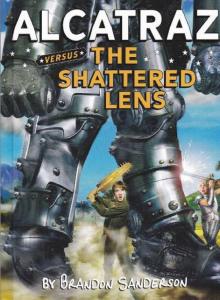 Alcatraz Versus the Shattered Lens
Alcatraz Versus the Shattered Lens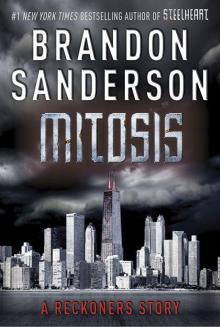 Mitosis
Mitosis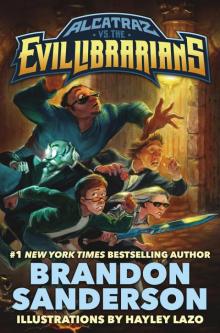 Alcatraz vs. The Evil Librarians
Alcatraz vs. The Evil Librarians Rhythm of War (9781429952040)
Rhythm of War (9781429952040)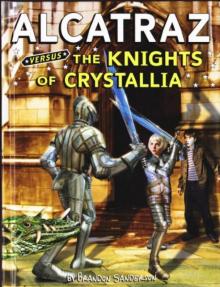 Alcatraz Versus the Knights of Crystallia
Alcatraz Versus the Knights of Crystallia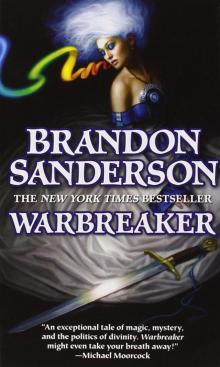 Warbreaker
Warbreaker Firstborn
Firstborn Starsight
Starsight Edgedancer
Edgedancer Perfect State
Perfect State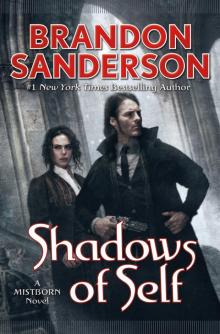 Shadows of Self
Shadows of Self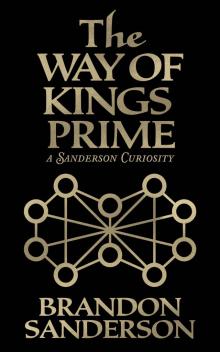 The Way of Kings Prime
The Way of Kings Prime Starsight (US)
Starsight (US) Shadows for Silence in the Forests of Hell
Shadows for Silence in the Forests of Hell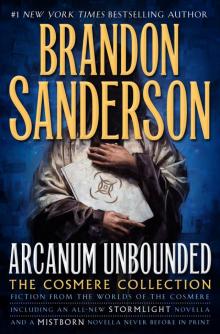 Arcanum Unbounded: The Cosmere Collection
Arcanum Unbounded: The Cosmere Collection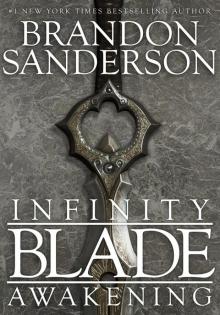 Awakening
Awakening Firefight
Firefight Dawnshard
Dawnshard Defending Elysium
Defending Elysium White Sand
White Sand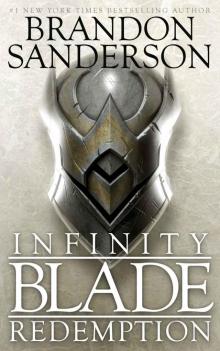 Infinity Blade: Redemption
Infinity Blade: Redemption The Final Empire
The Final Empire Skyward
Skyward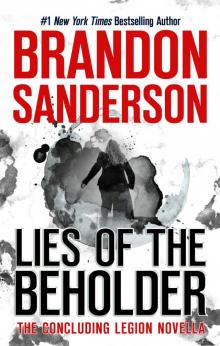 Lies of the Beholder
Lies of the Beholder Elantris e-1
Elantris e-1 Steelheart r-1
Steelheart r-1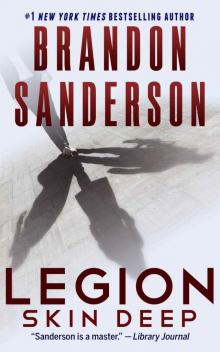 Legion: Skin Deep
Legion: Skin Deep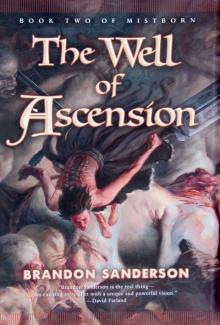 Well of Ascension
Well of Ascension Mistborn
Mistborn Alcatraz versus the Evil Librarians
Alcatraz versus the Evil Librarians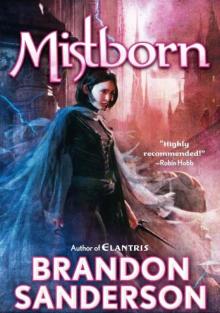 The Final Empire m-1
The Final Empire m-1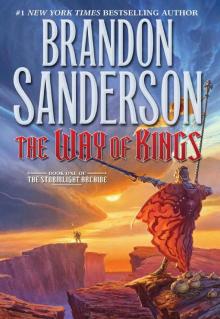 The Way of Kings (Stormlight Archive, The)
The Way of Kings (Stormlight Archive, The)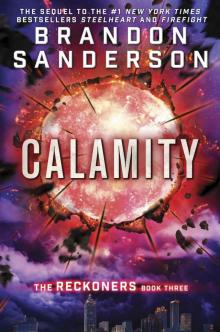 Calamity (The Reckoners)
Calamity (The Reckoners) Legion and the Emperor's Soul
Legion and the Emperor's Soul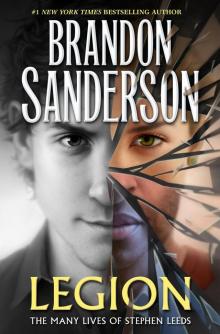 Legion: The Many Lives of Stephen Leeds
Legion: The Many Lives of Stephen Leeds The Mistborn Trilogy
The Mistborn Trilogy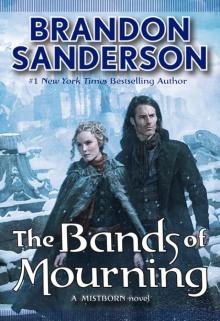 Bands of Mourning
Bands of Mourning Alcatraz
Alcatraz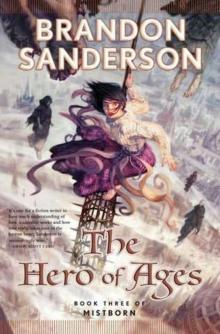 The Hero of Ages m-3
The Hero of Ages m-3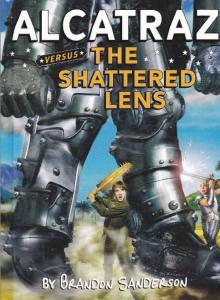 Alcatraz vs. the Shattered Lens
Alcatraz vs. the Shattered Lens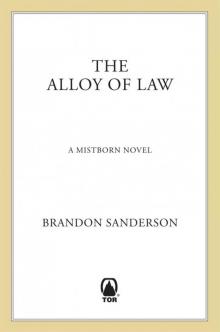 The Alloy of Law: A Mistborn Novel
The Alloy of Law: A Mistborn Novel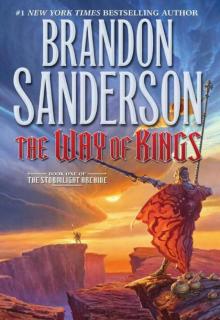 The Way of Kings sa-1
The Way of Kings sa-1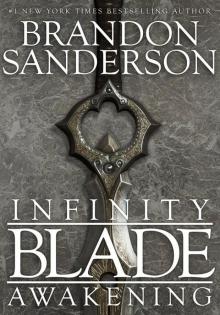 Infinity Blade: Awakening
Infinity Blade: Awakening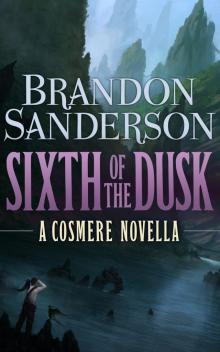 Sixth of the Dusk
Sixth of the Dusk The Stormlight Archive
The Stormlight Archive The Aether of Night
The Aether of Night